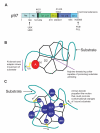p97-containing complexes in proliferation control and cancer: emerging culprits or guilt by association?
- PMID: 21103003
- PMCID: PMC2983488
- DOI: 10.1177/1947601910381381
p97-containing complexes in proliferation control and cancer: emerging culprits or guilt by association?
Abstract
p97 (also called VCP in metazoans and CDC48 in yeast) is a highly conserved, abundant and essential type II ATPase that functions in numerous ubiquitin signaling dependent processes. p97/Cd48 activities require a growing number of adaptor or accessory proteins that promote interactions with ubiquitinated proteins. p97 has human disease relevance as it is mutated in familial cases of inclusion body myopathy associated with Paget's disease of the bone and frontotemporal dementia (IBMPFD). There is also increasing evidence suggesting that p97 and/or some of its adaptors play a role in cancer. This review will summarize our existing knowledge of the biochemical, molecular and cellular activities of p97-containing complexes, with an ending focus on their potential role in malignancy.
Conflict of interest statement
The author(s) declared no potential conflicts of interest with respect to the authorship and/or publication of this article.
Figures



References
-
- Hochstrasser M. Ubiquitin-dependent protein degradation. Annu Rev Genet. 1996;30:405-39 - PubMed
-
- Hershko A, Ciechanover A. The ubiquitin system. Annu Rev Biochem. 1998;67:425-79 - PubMed
-
- Peng J, Schwartz D, Elias JE, et al. A proteomics approach to understanding protein ubiquitination. Nat Biotechnol. 2003;21:921-6 - PubMed
-
- Chen ZJ, Sun LJ. Nonproteolytic functions of ubiquitin in cell signaling. Mol Cell. 2009;33:275-86 - PubMed
Grants and funding
LinkOut - more resources
Full Text Sources
Other Literature Sources
Research Materials
Miscellaneous
